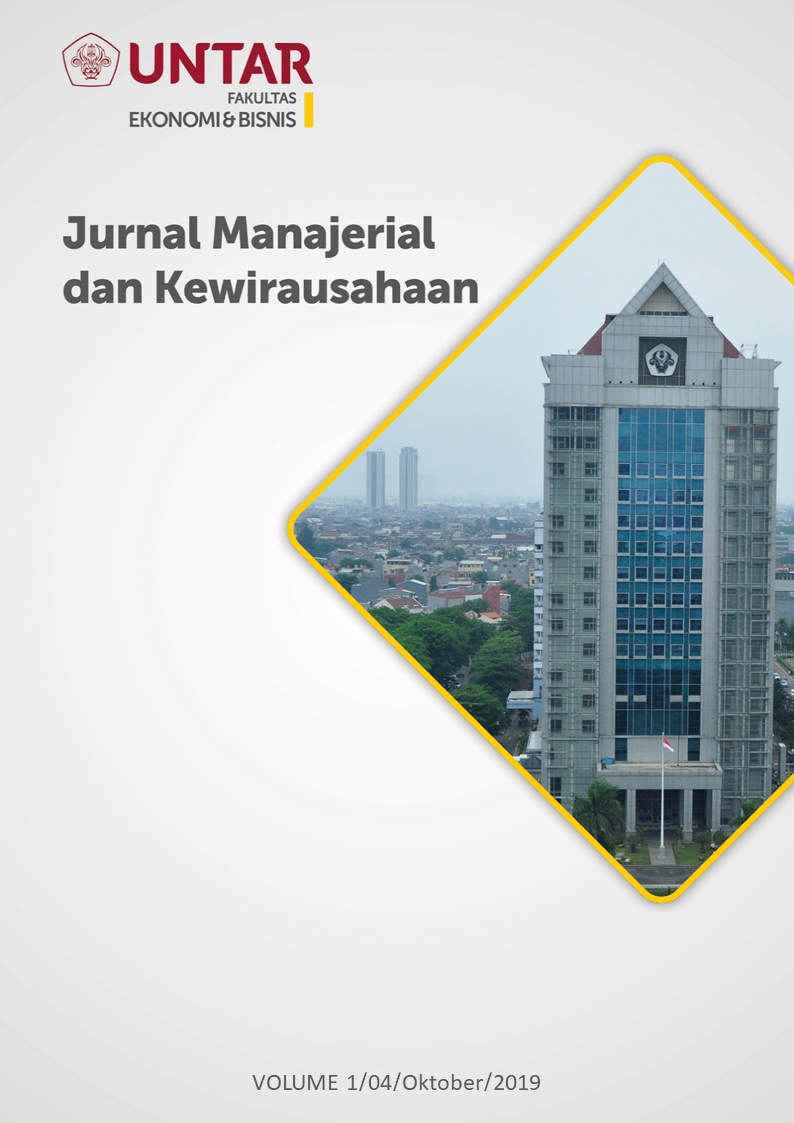Pengaruh Internal Marketing Terhadap Inovasi, Dengan Orientasi Kewirausahaan Sebagai Variabel Mediasi
Main Article Content
Abstract
The purpose of this study was to examine the effect of internal marketing on innovation in family businesses in West Jakarta, with entrepreneurial orientation as a mediating variable. The sample used in the study is 100 actors or family business members in West Jakarta and the sampling technique uses non-probability sampling. The method of collecting data in this study with questionnaires and data was measured using a 6 level Likert scale (1-6). Data analysis using SmartPLS 3.0 program. The results of this study indicate that 1) internal marketing has a positive and significant effect on innovation, 2) internal marketing has a positive and significant effect on entrepreneurial orientation, and 3) entrepreneurial orientation has a positive and significant effect on innovation
Tujuan dari penelitian ini adalah untuk menguji pengaruh internal marketing terhadap inovasi pada bisnis keluarga di Jakarta Barat, dengan orientasi kewirausahaan sebagai variabel mediasi . Sampel yang digunakan dalam penelitian adalah sebesar 100 pelaku atau anggota bisnis keluarga di Jakarta Barat dan teknik pengambilan sampel menggunakan non-probability sampling. Metode pengumpulan data dalam penelitian ini dengan kuisioner dan data diukur dengan menggunakan skala likert 6 tingkat (1-6). Analisis data menggunakan progam SmartPLS 3.0. Hasil penelitian ini menunjukkan bahwa 1) internal marketing berpengaruh positif dan signifikan terhadap inovasi, 2) internal marketing berpengaruh positif dan signifikan terhadap orientasi kewirausahaan, dan 3) orientasi kewirausahaan berpengaruh positif dan signifikan terhadap inovasi
Article Details
Section
This work is licensed under a Jurnal Muara Ilmu Ekonomi dan Bisnis Creative Commons Attribution-ShareAlike 4.0 International License.,/p>
References
Ahmed, P. K., Rafiq, M. & Saad, N. M. (2003). Internal marketing and the mediating role
of organisational competencies. European Journal of Marketing, 37, pp. 1221-1241.
Aritonang, R. Lerbin. (1998). Penelitian pemasaran-cetakan pertama. Jakarta : UPT
Universitas Tarumanagara.
Bagozzi, R. P., & Yi, Y. (2012). Specification, evaluation, and interpretation of structural
equation models.Journal of the Academy of Marketing Science, 40(1), 8–34.
Baker, A. & Sinkula, S. (2009). The Complementary Effects of Market Orientation and
Entrepreneurial Orientation on Profitability in Small Business, Journal of Small
Management, 47(4), pp. 443-464.
Chen, Y. C., & Lin, S. (2013). Applying importance-performance analysis for improving
internal marketing ofhospital management in Taiwan.International Business
Research, 6(4), 22–45.
Bommer, M. and Jalajas, D., (2002). The innovation work environment of high-technology
SMEs in the US and Canada. R&D Management. 32 (5), 379-386.
Craig, J. B. L., & Moores, K. (2006). A 10-year longitudinal investigation of strategy,
systems, and environment on innovation in family firms.Family Business Review,
(1), 1–10
Covin, J.G, Green, K.M. and Slevin, D.P., (2006).Strategic Process Effect on The
Entrepreneurial Orientation-Sales Growth Rate Relationship, Entrepreneurship
Theory and Practice, 30 (1) : 57-81.
ELSamen, A. A., dan M. Alshurideh. (2010). The Impact Of Internal Marketing On
Internal Service Quality: A Case Study In a Jordanian Pharmaceutical Company.
International Journal Of Business And Management. 7 (19): 84-95.
Ghozali, Imam. (2014). Structural Equation Modeling Metode Alternatif Dengan
Partial Least Squares (PLS). Edisi 4. Semarang: Badan Penerbit Universitas
Diponegoro.
Greene, W. E., Walls, G. D & Schrest, L. J. (1994). Internal marketing: The key to external
marketing success. Journal of Services Market. 8: 5-13.
Gronroos, C. (1994). From marketing mix to relationship marketing: towards a paradigm
shift in marketing.Management Decision, 32(2), 4–20.
Hotho, S. and Champion, K., (2011). Small businesses in the new creative industries:
innovation as a people management challenge. Management Decision. 49 (1), 29 –
Jalilvand, M. R., Khalilakbar. R., Vosta, L. N., Pool, K. J., Tabaeeian, A. R. (2017). The
effect of internal marketing and entrepreneurial orientation on innovation in family
businesses: Springer science.
Kajalo, S., & Lindblom, A. (2015). Market orientation, entrepreneurial orientation and
business performance among small retailers. International Journal of Retail &
Distribution Management, 43(7), 580–596.
Kocak, A., Alan, C. & Sonyel, O. (2016). Market, entrepreneurial, and tecnologi
orientations: impact on innovation and firm perfomance, management decision, vol
No.2, pp. 248-270.
Madhoushi, M., Sadati, A., & Delavari, H. (2011). Entrepreneurial Orientation and
Innovation Performance: The Mediating Role of Knowledge Management. Asian
Journal of Business Management, 3(4), 310-316.
Malhotra, N.K. (2009). Riset Pemasaran, Edisi keempat, Jilid 1, PT Indeks, Jakarta
Miller, Danny. (1983). The Correlates Of Entrepreneurship In Three Types Of
Firms. Management Science, 29: 770-791.
Patrick, K. M. and Justin, D. (2010), Entrepreneurial Orientation and Firm Performance:
The Unique of innovativeness, Proactiveness, and Risk-taking. Journal of Small
Business and Entrepreneurship, 23(1), 39-51.
Piercy, N. F. (1995). Customer satisfaction and the internal market: marketing our
customers to our employees. Journal of Marketing Practice: Applied Marketing
Science, 1(1), 22-44.
Rafiq, M., & Ahmed, P. (1993). The scope of internal marketing: defining the boundary
between marketing and human resource management. Journal of Marketing
Management, 9, 219–232.
Sekaran, U. & Bougie, R. (2013). Research Methods for Business. United Kingdom: Jhon
Wiley & Sons Ltd.
Sekaran, U. (2006). Research methods for business (terjemahan). Edisi 4.jakarta: salemba
empat.
Zahra, S. A., Sapienza, H. J., & Davidsson, P. (2006), Entrepreneurship and Dynamic
Capabilities: A Review, Model and Research Agenda, Journal of Management
Studies, 43(4), pp. 917–955.
Zampetakis, L. & Moustakis, V., (2007). Fostering corporate entrepreneurship through
internal marketing. Implications for change in the public sector. European Journal of
Innovation Management. 10 (4), 413-43.

